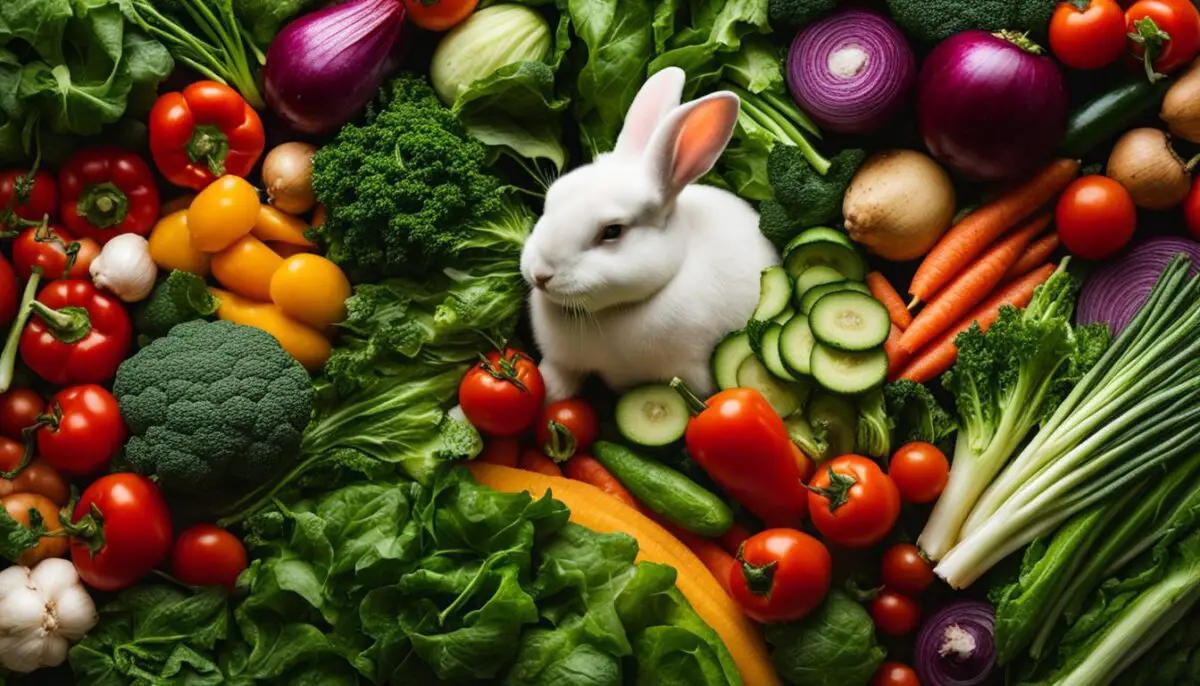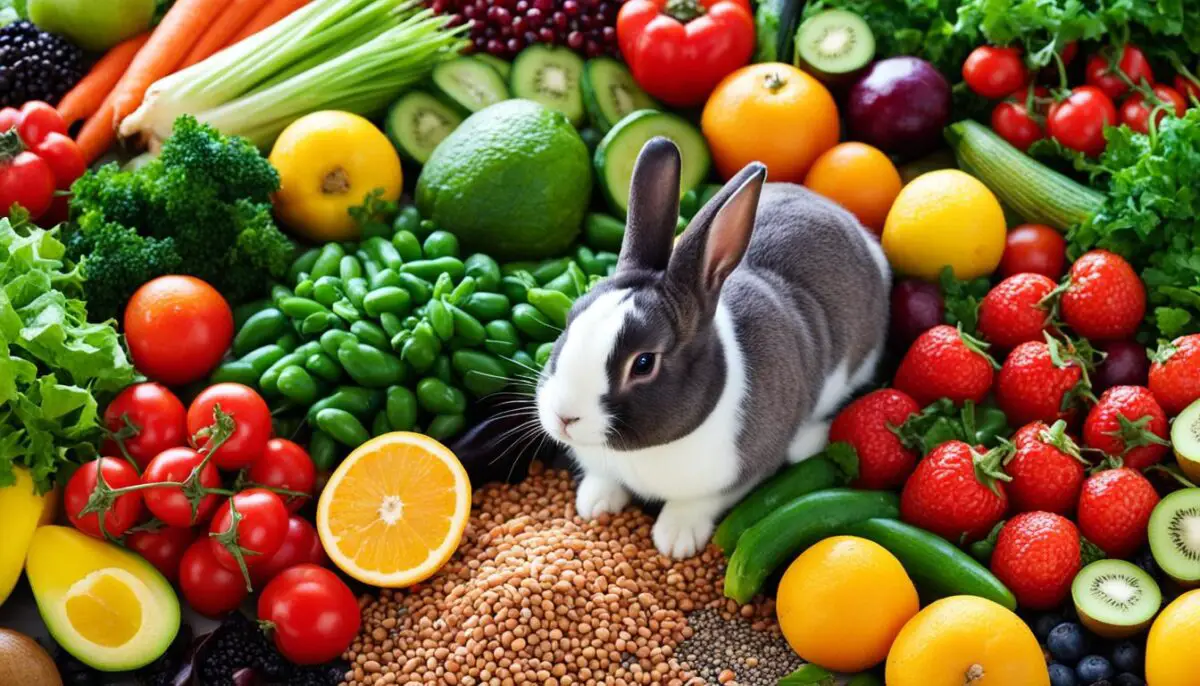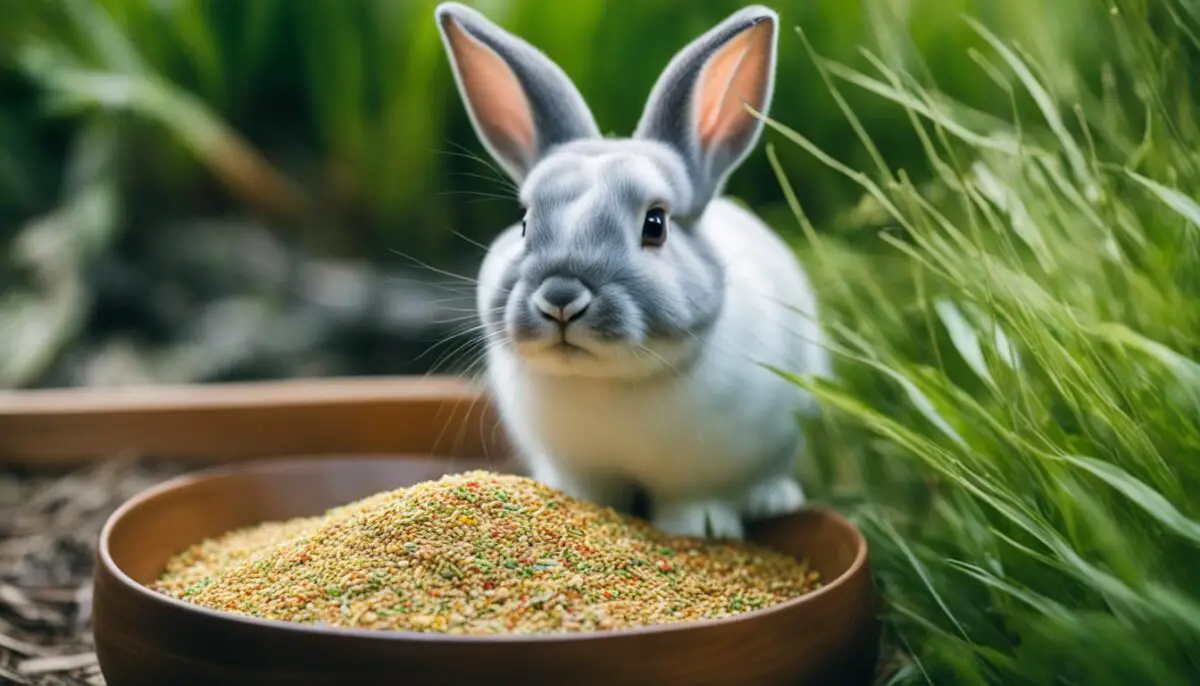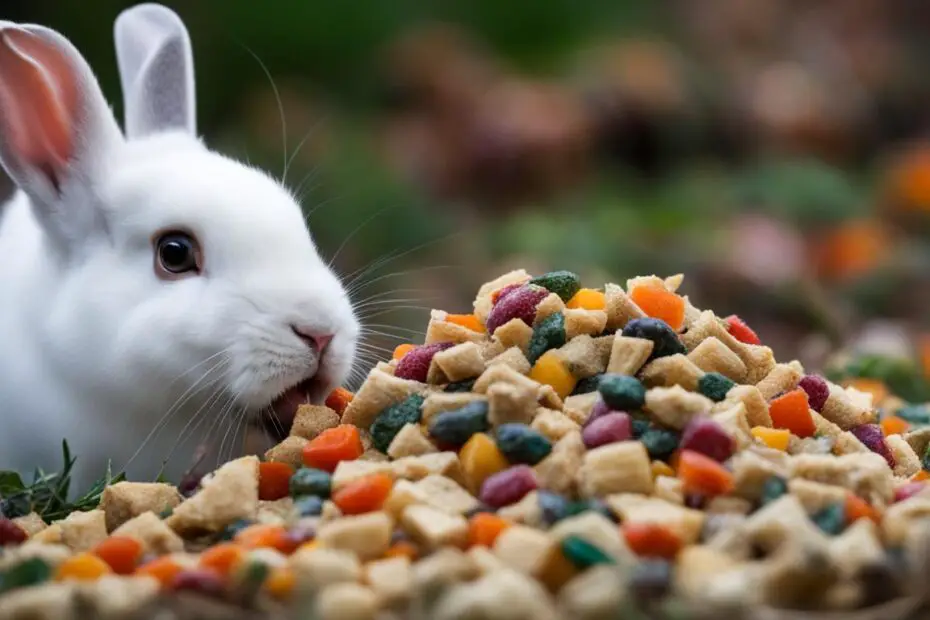When it comes to feeding rabbits, it’s important to understand their specific nutritional needs. One common question that comes up is whether rabbits can eat sweet feed, a mixture commonly used for horses. Let’s explore this topic and find out what constitutes a suitable diet for rabbits.
Key Takeaways:
- Sweet feed, a common horse feed mixture, is not suitable for rabbits.
- Rabbits have specific nutritional needs, including a high percentage of hay in their diet, along with a mix of vegetables and a small amount of pellets.
- Feeding sweet feed to rabbits can lead to potential risks such as disruption of gut flora, obesity, dental problems, and gastrointestinal issues.
- Providing a healthy, balanced diet is crucial for rabbits’ overall well-being.
- If your rabbit consumes sweet feed, it’s important to monitor them and contact a veterinarian if necessary.
The Importance of a Healthy Rabbit Diet
Rabbits have a unique digestive system, and their nutritional needs are essential for maintaining their overall health and well-being. A healthy diet is crucial to ensure that rabbits receive the necessary nutrients to thrive.
The main component of a rabbit’s diet should be high-quality hay. Hay is a crucial source of fiber, which aids in digestion and promotes a healthy gut. It helps prevent issues such as hairballs and gastrointestinal stasis, which can be detrimental to a rabbit’s health. Providing unlimited access to hay throughout the day is essential for a rabbit’s well-being.
In addition to hay, rabbits also require a variety of fresh vegetables to meet their nutritional needs. Leafy greens such as romaine lettuce, kale, and spinach are excellent choices. These vegetables provide essential vitamins and minerals that contribute to a healthy immune system and overall vitality. It’s important to introduce new vegetables gradually to avoid digestive upset and monitor which ones your rabbit enjoys the most.
While hay and vegetables form the foundation of a rabbit’s diet, a small amount of pellets can also be included. Look for high-quality pellets that are specifically formulated for rabbits. These pellets should comprise a small portion of their daily food intake and should not be the primary focus of their diet.
Avoid feeding rabbits high-sugar foods like sweet feed. The high sugar content in sweet feed can disrupt their digestive system and lead to various health issues. It’s best to stick to a natural, rabbit-friendly diet consisting of hay, vegetables, and a small amount of pellets.

Providing a healthy, balanced diet is crucial for rabbits’ overall well-being. It contributes to their physical health, promotes healthy digestion, and helps prevent obesity and dental problems. Remember to always consult with a veterinarian or a rabbit nutrition specialist to ensure that you are meeting your rabbit’s specific dietary needs.
Expert Tip:
To ensure a healthy diet for your rabbit, consider incorporating a variety of vegetables and herbs such as parsley, cilantro, and carrot tops. These additions can provide enrichment and variety to your rabbit’s meals.
| Nutritional Needs | Recommended Sources |
|---|---|
| Fiber | High-quality hay |
| Vitamins and Minerals | Fresh vegetables (leafy greens, herbs) |
| Protein | Minimal amount of pellets formulated for rabbits |
By focusing on proper rabbit nutrition and providing a well-rounded diet, you can ensure that your furry friend leads a happy and healthy life.
Potential Risks of Feeding Sweet Feed to Rabbits
Feeding sweet feed to rabbits can pose significant health risks. The high sugar content and complex carbohydrates in sweet feed can disrupt the delicate balance of a rabbit’s digestive system, leading to several potential problems.
One of the main risks of feeding sweet feed to rabbits is the disruption of gut flora. Rabbits have a sensitive digestive system that relies on a healthy balance of beneficial bacteria. The high sugar content in sweet feed can cause an overgrowth of harmful bacteria, leading to gastrointestinal issues and discomfort for your furry friend.
Sweet feed can also contribute to rapid weight gain and obesity in rabbits. The excess sugars and calories in sweet feed can easily lead to unhealthy weight gain, putting strain on their joints and increasing the risk of other health problems. It’s important to remember that rabbits are herbivores and derive most of their nutrition from hay, vegetables, and a small amount of pellets.
Furthermore, the high sugar content in sweet feed can have detrimental effects on a rabbit’s dental health. Rabbits have constantly growing teeth that need to be worn down through a proper diet. Excessive sugar consumption can lead to tooth decay and other oral health issues, causing pain and discomfort for your pet.
Changes in diet, such as introducing sweet feed, can also lead to a condition known as gastrointestinal stasis. This is a potentially life-threatening condition in rabbits where their digestive system slows down or stops completely. It can result in gas buildup, bloating, and severe discomfort for the rabbit. If left untreated, gastrointestinal stasis can be fatal.
To ensure the well-being of your furry friend, it’s essential to follow proper rabbit feeding guidelines and avoid feeding sweet feed. Stick to a diet that consists primarily of high-quality hay, fresh vegetables, and a small amount of pellets. This provides the necessary nutrients for rabbits to maintain optimal health and avoid potential risks associated with sweet feed.

Potential Risks of Feeding Sweet Feed to Rabbits
| Risks | Effects |
|---|---|
| Gut Flora Disruption | Imbalance of beneficial bacteria, leading to digestive issues |
| Rapid Weight Gain and Obesity | Increased risk of joint problems and overall health issues |
| Dental Problems | Tooth decay, oral pain and discomfort |
| Gastrointestinal Stasis | Potentially life-threatening condition requiring immediate veterinary attention |
Expert Tips for a Healthy Rabbit Diet
To ensure optimal health for your rabbit, it’s crucial to provide them with a suitable diet consisting of the right rabbit food options and following proper rabbit feeding guidelines. Here are some expert tips to help you maintain a healthy rabbit diet:
1. Provide Unlimited Access to Fresh Hay
Fresh hay should be the main component of your rabbit’s diet. It is rich in fiber and promotes digestive health. Ensure your rabbit has access to high-quality hay at all times. Timothy hay, orchard grass, and oat hay are excellent choices.
2. Include a Variety of Leafy Greens
Every day, incorporate a variety of leafy greens into your rabbit’s diet. This can include romaine lettuce, Bok choy, mustard greens, cilantro, and parsley. These greens provide essential nutrients and add variety to their meals.
3. Offer High-Quality Rabbit Pellets
Provide your rabbit with a small amount of high-quality pellets formulated specifically for rabbits. These pellets are designed to ensure that your rabbit receives all the necessary vitamins and minerals. Avoid overfeeding pellets, as they should only comprise a small portion of their diet.
4. Limit Treats and Avoid Sweet Feed
Treats should be given sparingly to avoid weight gain and disrupt the balance of your rabbit’s diet. Completely avoid feeding sweet feed, as it is not suitable for rabbits and can cause various health problems.
By following these expert tips, you can ensure that your rabbit receives a suitable diet that fulfills their nutritional needs.

“It’s important to remember that prevention is always better than cure when it comes to your rabbit’s health. Ensure that sweet feed and other unsuitable foods are kept securely out of your rabbit’s reach to avoid any accidental ingestions.”
Why Sweet Feed is Not Suitable for Rabbits
Sweet feed, with its high sugar content and complex carbohydrate composition, is not an appropriate food choice for rabbits. These adorable creatures have a unique digestive system that thrives on a high-fiber diet primarily consisting of hay. Introducing sweet feed into their diet can disrupt the delicate balance of nutrients and lead to various health problems. It’s crucial to prioritize the proper nutrition for rabbits to ensure their overall well-being.
Potential Health Risks of Sweet Feed
The consumption of sweet feed by rabbits can result in numerous digestive issues, obesity, dental problems, and gastrointestinal complications. The high sugar content in sweet feed disrupts the delicate balance of gut flora in rabbits, leading to potential disruptions in their digestive processes. Furthermore, the complex carbohydrates in sweet feed can cause rapid weight gain and obesity in rabbits. Excessive weight gain can lead to additional health problems such as joint issues and heart disease.
“Feeding rabbits sweet feed can have significant negative impacts on their health. It’s important to offer them a diet that meets their specific nutritional needs.”
Importance of a Suitable Diet for Rabbits
The nutritional needs of rabbits are unique and should be met through a carefully tailored diet. A suitable rabbit diet consists of a high percentage of hay, which provides essential fiber for proper digestion. In addition to hay, a variety of fresh vegetables should be included to offer the necessary vitamins and minerals. A small amount of rabbit-specific pellets can also be provided to ensure they receive all essential nutrients. A well-balanced diet plays a vital role in maintaining the overall health and longevity of rabbits.
Rabbit Nutrition – A Balanced Approach
To ensure your rabbit’s diet is nutritionally balanced, it’s important to follow these guidelines:
- Offer unlimited access to fresh, high-quality hay.
- Include a variety of leafy greens in their diet, such as romaine lettuce, Bok choy, and mustard greens.
- Provide a small amount of high-quality rabbit pellets daily.
- Avoid offering any sweet feed or other high-sugar foods as part of their diet.
By adhering to these guidelines, you can provide your beloved pet with a suitable and well-rounded diet that supports their overall health and vitality.
Image:
Conclusion
In conclusion, it is important to remember that sweet feed is not suitable for rabbits. While this common horse feed mixture may seem tempting, it can cause a range of health problems for our furry friends. Feeding rabbits a balanced and appropriate diet is crucial for their overall well-being.
Rabbits have specific nutritional needs that are best met through a diet that includes high-quality hay, a variety of fresh vegetables, and a small amount of pellets formulated specifically for rabbits. These foods provide the necessary fiber, vitamins, and minerals that rabbits need to thrive.
By avoiding high-sugar foods like sweet feed, rabbit owners can help prevent digestive issues, obesity, dental problems, and gastrointestinal complications in their beloved pets. However, if a rabbit accidentally consumes sweet feed, it is important to monitor them closely and seek veterinary advice if any signs of distress or discomfort arise.
Consulting a veterinarian or a rabbit nutrition specialist is highly recommended to ensure that your rabbit’s nutritional needs are met and to provide guidance on feeding rabbits safely. By prioritizing the well-being of your furry friend and providing them with a suitable diet, you can help ensure their health and longevity.
FAQ
Can rabbits eat sweet feed?
No, sweet feed is not suitable for rabbits as it can cause digestive issues and disrupt their balanced diet.
What should rabbits be fed?
Rabbits should have a diet consisting primarily of high-quality hay, along with a mix of fresh vegetables and a small amount of pellets.
What are the risks of feeding sweet feed to rabbits?
Feeding sweet feed to rabbits can lead to potential risks such as disruption of gut flora, obesity, dental problems, and gastrointestinal issues.
What are some expert tips for a healthy rabbit diet?
Experts recommend providing unlimited access to fresh hay, incorporating a variety of leafy greens, offering a small amount of pellets, and limiting treats.
What should I do if my rabbit consumes sweet feed?
Monitor your rabbit for any changes in behavior or digestion. If a small amount was consumed and there are no signs of distress, continue observing. If a large amount was consumed or your rabbit shows discomfort, contact a veterinarian immediately.
Why is sweet feed not suitable for rabbits?
Sweet feed has a high sugar content and complex carbohydrate composition, which can disrupt a rabbit’s digestive system and lead to various health problems.


